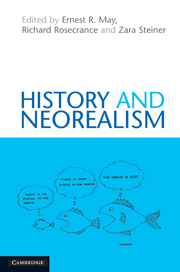Book contents
- Frontmatter
- Contents
- List of tables
- Notes on contributors
- Acknowledgments
- 1 Theory and international history
- 2 Transformations in power
- 3 Domestically driven deviations: internal regimes, leaders, and realism's power line
- 4 How international institutions affect outcomes
- 5 Not even for the seventeenth and eighteenth centuries: power and order in the early modern era
- 6 Austria-Hungary and the coming of the First World War
- 7 British decisions for peace and war 1938–1939: the rise and fall of realism
- 8 Realism and risk in 1938: German foreign policy and the Munich Crisis
- 9 Domestic politics, interservice impasse, and Japan's decisions for war
- 10 Military audacity: Mao Zedong, Liu Shaoqi, and China's adventure in Korea
- 11 The United States' underuse of military power
- 12 The overuse of American power
- 13 Redrawing the Soviet power line: Gorbachev and the end of the Cold War
- 14 Shared sovereignty in the European Union: Germany's economic governance
- 15 John Mearsheimer's “elementary geometry of power”: Euclidean moment or an intellectual blind alley?
- 16 History and neorealism reconsidered
- Index
- References
3 - Domestically driven deviations: internal regimes, leaders, and realism's power line
Published online by Cambridge University Press: 05 June 2012
- Frontmatter
- Contents
- List of tables
- Notes on contributors
- Acknowledgments
- 1 Theory and international history
- 2 Transformations in power
- 3 Domestically driven deviations: internal regimes, leaders, and realism's power line
- 4 How international institutions affect outcomes
- 5 Not even for the seventeenth and eighteenth centuries: power and order in the early modern era
- 6 Austria-Hungary and the coming of the First World War
- 7 British decisions for peace and war 1938–1939: the rise and fall of realism
- 8 Realism and risk in 1938: German foreign policy and the Munich Crisis
- 9 Domestic politics, interservice impasse, and Japan's decisions for war
- 10 Military audacity: Mao Zedong, Liu Shaoqi, and China's adventure in Korea
- 11 The United States' underuse of military power
- 12 The overuse of American power
- 13 Redrawing the Soviet power line: Gorbachev and the end of the Cold War
- 14 Shared sovereignty in the European Union: Germany's economic governance
- 15 John Mearsheimer's “elementary geometry of power”: Euclidean moment or an intellectual blind alley?
- 16 History and neorealism reconsidered
- Index
- References
Summary
Can we predict accurately a state's behavior from its international power ranking? May we safely predict, with Thucydides' Athenians, that “the strong do what they can and the weak suffer what they must?” Not all structural realists answer in the affirmative. Waltz's denial is the most prominent: his neorealism, he asserts, is a theory of international outcomes, not of foreign policy. It cannot predict when A will seek to ally with state B, but only when an A+B alliance will form. A systemic theory predicts systemic outcomes. Unit-level outcomes, such as alliance seeking, require unit-level explanations such as domestic politics or the traits of individual leaders.
Most structural realists find Waltz, in this one aspect, insufficiently ambitious. Elman, Copeland, Mearsheimer, and others insist that international structure is strong enough to constrain, and hence explain, states' foreign policies as well. These scholars appear on firm ground: if a balance of power entails states' acting, intentionally or not, so as to form that balance, then it follows that a theory predicting that balance must predict that states will act so as to bring it about. Indeed, Waltz himself makes claims about individual states' policies as vindication for his theory; thus pressure from the international system caused the young Soviet Union to change from a revolutionary, disruptive power to a pragmatic one that aligned with Weimar Germany in 1922.
- Type
- Chapter
- Information
- History and Neorealism , pp. 29 - 48Publisher: Cambridge University PressPrint publication year: 2010



